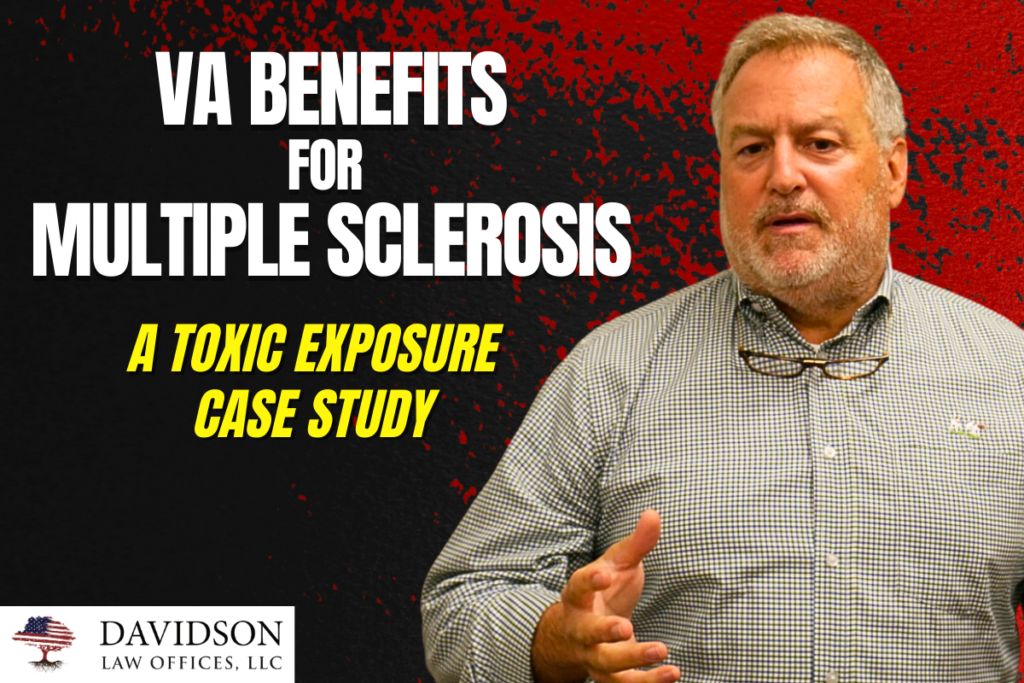This is a follow-up to our previous blog where we showed a letter from “Feeling Screwed by My Government.” We talked about his multiple sclerosis and his exposure to toxins while serving in the US Army at Fort McClellan. In this blog we’re going to be talking about the medical evidence for his case and how we’ll help him get the compensation he so richly deserves.
Compiling Medical Evidence for His Case
The first thing I like to do with a case like this is ask a series of questions. These questions help determine if the medical evidence for a disability claim exists. They also help us determine if we have a fighting chance with the VA. Below are some of those questions.
• What do his service treatment records say?
• Do the service treatment records indicate anything that would lead a doctor to diagnose multiple sclerosis?
• Does his separation medical exam say anything about complaints related to multiple sclerosis?
• Is there any medical evidence of multiple sclerosis in his service records?
• Did he experience multiple sclerosis symptoms while in service?
• Did he lose any service time because of any multiple sclerosis symptoms?
These questions hopefully give you an idea of what kind of medical evidence we need to submit to the VA. We need this medical evidence to link his multiple sclerosis diagnosis to his service.
Looking at this Veteran’s Records
In previous blogs I’ve stated that the key phrase we need is, “It’s more likely that not that the exposure to toxins caused his/her disability.” We need to see words or phrases like that in the medical records of the Veteran seeking VA disability compensation.
In speaking with this Veteran about his medical records, he told me that he submitted numerous pages of reports relating to his claim of toxic exposure. These reports were from various doctors, and concluded that “it’s more likely than not” that those serving at Fort McClellan between 1974 and 1976 were exposed to herbicide agent chemicals.
I was quick to remind this Veteran that he wasn’t serving at Fort McClellan in 1976, and that he didn’t get there until 1986. I didn’t understand the connection he was trying to make with those earlier dates. I then asked him if there was anything else he submitted.
He showed me a report from his primary MS doctor. This doctor opined that MS is an auto-immune disorder and that agent orange is a powerful nerve toxin that alters the immune system. The doctor further said that it’s as least likely as not that agent orange made him more prone to develop an auto-immune disorder like MS.
What Else Do We Need?
This is a start, but I reminded him that we need some more. The VA is looking for more definitive medical evidence that says yes, his exposure to toxins more likely than not caused his MS. Medical evidence that simply says the toxic exposure made him more prone is probably not going to be sufficient to get an approved claim. I know these kinds of medical evidence statements can be tough to obtain, but that’s what we need.
I also asked him if there were any other government agency reports that he submitted to the VA. In his original letter to me, he provided links to several reports that spoke to the level of toxins at Fort McClellan, Anniston, and the Army Depot. He said that he didn’t submit those with his original claim, and I told him we need to make sure we do.
The VA is aware of these reports, but they’re not part of his record unless we submit them. That will help to bolster the medical evidence for his disability claim. It builds the argument that there were a mountain of pollutants at Fort McClellan and those pollutants are what caused his multiple sclerosis.
I think the reports are critical. They’ll conclusively show the VA that you were exposed to these dioxins while stationed at Fort McClellan. There could be a possible conflict between the VA’s evidence and your evidence, but you get the benefit of the doubt when that happens. As they say in baseball, the tie goes to the runner.
In addition to those reports, we also need some stronger medical opinions. We need medical evidence that helps to “beef up” his multiple sclerosis diagnosis. We need statements with words that are more definitive, as opposed to weak works like “more prone.”
I do believe that the VA was wrong in denying this Veteran’s claim. And I do believe that we can get him approved if we compile the right medical evidence for him. These toxic exposure cases can be tricky, especially when you don’t have the benefit of a presumptive condition. But we’ve been very successful at getting Veterans the benefits they deserve, and we’ll continue to do so!
Contact Us So We Can Help!
If you need assistance with VA disability claims, complete this form or give us a call at (229) 226-8183. If you’d like to see this blog in video format, you can watch it below. Please be sure to SUBSCRIBE to our YouTube channel and click the bell notification button so that you’re notified each time we publish a new video.

